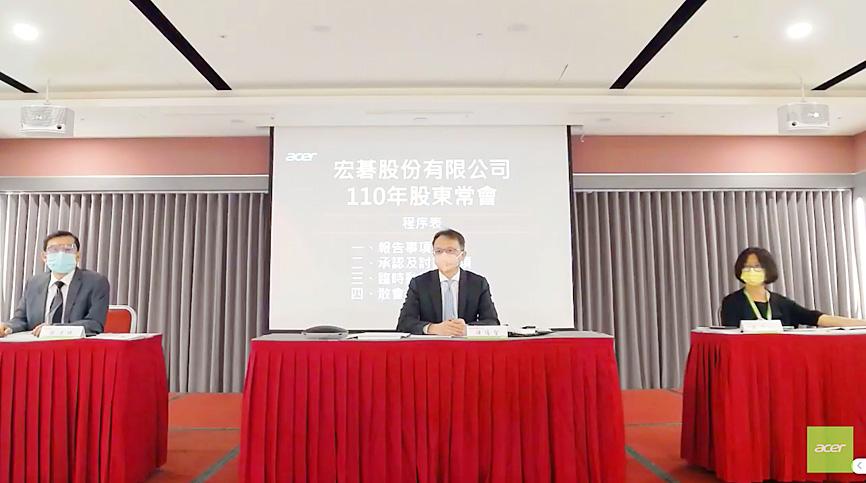Supply of laptops has outstripped demand since March last year, with no end in sight, PC vendor Acer Inc (宏碁) said yesterday, adding that it is creating a more diverse businesses portfolio to boost revenue.
“E-learning and work-from-home trends have created demand for our laptops, but that has not stopped us from pursuing multiple business engines,” Acer chief executive officer Jason Chen (陳俊聖) said.
“We have moved beyond our core product portfolio of personal computers and monitors into services and data security,” Chen said. “We have brought four subsidiaries to the stock market and purchased two companies.”

Photo: CNA
“A well-managed company is constantly reaching out to new markets,” he said.
Acer shareholders yesterday approved a cash dividend distribution of NT$1.5 per common share, representing a payout ratio of 75 percent based on the company’s earnings per share of NT$2 last year.
Acer reported revenue of NT$30.02 billion (US$1.07 billion) last month, the highest in seven years, up 16.9 percent year-on-year and 21 percent month-on-month.
For the first half of the year, consolidated revenue was NT$151.33 billion, up 32.2 percent year-on-year.
Revenue highlights last month included its gaming products, which grew 35.7 percent year-on-year, and Chromebooks, which rose 41.8 percent year-on-year, company data showed.
All of Acer’s listed subsidiaries have reported year-on-year revenue growth for the second quarter, the company said.
Revenue at Highpoint Service Network (海伯特) grew 9.1 percent year-on-year, Altos computing (安圖斯科技) grew 24.9 percent, Acer ITS, which makes smart parking meters and e-transaction solutions, rose 32.2 percent and Acer Gadget Inc (倚天酷碁) increased 21.4 percent, Acer Inc said.

Nvidia Corp’s demand for advanced packaging from Taiwan Semiconductor Manufacturing Co (TSMC, 台積電) remains strong though the kind of technology it needs is changing, Nvidia CEO Jensen Huang (黃仁勳) said yesterday, after he was asked whether the company was cutting orders. Nvidia’s most advanced artificial intelligence (AI) chip, Blackwell, consists of multiple chips glued together using a complex chip-on-wafer-on-substrate (CoWoS) advanced packaging technology offered by TSMC, Nvidia’s main contract chipmaker. “As we move into Blackwell, we will use largely CoWoS-L. Of course, we’re still manufacturing Hopper, and Hopper will use CowoS-S. We will also transition the CoWoS-S capacity to CoWos-L,” Huang said

Nvidia Corp CEO Jensen Huang (黃仁勳) is expected to miss the inauguration of US president-elect Donald Trump on Monday, bucking a trend among high-profile US technology leaders. Huang is visiting East Asia this week, as he typically does around the time of the Lunar New Year, a person familiar with the situation said. He has never previously attended a US presidential inauguration, said the person, who asked not to be identified, because the plans have not been announced. That makes Nvidia an exception among the most valuable technology companies, most of which are sending cofounders or CEOs to the event. That includes

INDUSTRY LEADER: TSMC aims to continue outperforming the industry’s growth and makes 2025 another strong growth year, chairman and CEO C.C. Wei says Taiwan Semiconductor Manufacturing Co (TSMC, 台積電), a major chip supplier to Nvidia Corp and Apple Inc, yesterday said it aims to grow revenue by about 25 percent this year, driven by robust demand for artificial intelligence (AI) chips. That means TSMC would continue to outpace the foundry industry’s 10 percent annual growth this year based on the chipmaker’s estimate. The chipmaker expects revenue from AI-related chips to double this year, extending a three-fold increase last year. The growth would quicken over the next five years at a compound annual growth rate of 45 percent, fueled by strong demand for the high-performance computing

TARIFF TRADE-OFF: Machinery exports to China dropped after Beijing ended its tariff reductions in June, while potential new tariffs fueled ‘front-loaded’ orders to the US The nation’s machinery exports to the US amounted to US$7.19 billion last year, surpassing the US$6.86 billion to China to become the largest export destination for the local machinery industry, the Taiwan Association of Machinery Industry (TAMI, 台灣機械公會) said in a report on Jan. 10. It came as some manufacturers brought forward or “front-loaded” US-bound shipments as required by customers ahead of potential tariffs imposed by the new US administration, the association said. During his campaign, US president-elect Donald Trump threatened tariffs of as high as 60 percent on Chinese goods and 10 percent to 20 percent on imports from other countries.